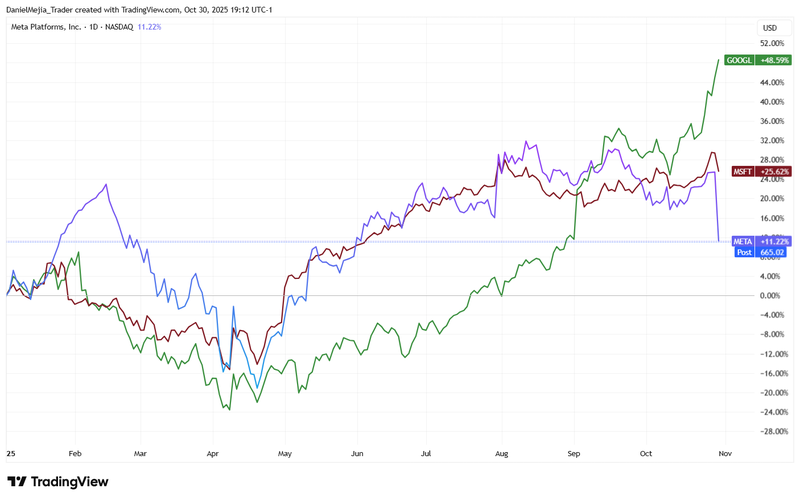US stocks fall on Meta earnings, AI cost concerns
US equity indices declined after Meta Platforms reported a substantial year-on-year fall in earnings per share (EPS), which weighed on market sentiment and prompted broad profit-taking. Investors also pared expectations for a 25-basis-point Federal Reserve cut in December following comments from Chair Jerome Powell.

Major US indices fell by roughly 0.9 per cent on average after Meta’s EPS disappointed and investors absorbed higher AI-related capex guidance.
Meta’s shares declined c. 11.3 per cent after EPS fell sharply year-on-year (around −85 per cent), well below analysts’ forecasts.
Microsoft signalled materially higher capital expenditure for AI and its shares fell c. 2.9 per cent; Alphabet outperformed and reached a record high.
Amazon and Apple reported after the close with revenues and EPS above consensus, reflecting ongoing demand for cloud services and iPhone sales respectively.
A reported US–China trade truce provided some relief on the commercial front, while the BoJ and ECB left policy rates unchanged.
US indices retreat as Meta’s earnings disappoint and AI investment concerns mount
US equity markets moved lower following mixed results from major technology companies. Although Alphabet, Microsoft and Meta all beat revenue expectations, the market reaction was dominated by Meta’s dramatic earnings miss: the company reported EPS materially below consensus — a year-on-year decline of approximately 85 per cent — which precipitated an c. 11.3 per cent fall in its share price to US$666.47.
Investor concern intensified after Meta signalled significant increases in capital expenditure next year to support AI initiatives. High anticipated AI capex at both Meta and Microsoft prompted market participants to reassess near-term profitability and cash-flow trajectories for large technology firms. Microsoft’s stock fell c. 2.9 per cent to US$525.76 amid disclosure of elevated capex expectations. By contrast, Alphabet traded positively, rising c. 2.52 per cent to US$281.48 as its advertising and cloud segments continued to demonstrate resilience.
The broader market reaction reflected these corporate signals together with renewed caution about the policy outlook. Comments from Federal Reserve Chair Jerome Powell reduced the perceived likelihood of a further 25-basis-point cut in December, contributing to risk-off sentiment. On the day, the S&P 500 declined 0.99 per cent to 6,822 points, the Dow Jones fell 0.23 per cent to 47,522, and the Nasdaq-100 eased 1.47 per cent to 25,734.

Figure 1. Meta, Microsoft, and Alphabet stock prices (Year-to-Date). Source: data from the Nasdaq Exchange. Figure obtained via TradingView.
Amazon and Apple beat estimates in Q3 financial results
After the close in New York, Amazon and Apple released third-quarter results that exceeded analysts’ expectations. Amazon reported revenue of US$180.2 billion versus a consensus of US$177.75 billion (year-on-year growth approximately 13.4 per cent) and EPS of US$1.95 against an expected US$1.56 (around a 36 per cent year-on-year increase). The company cited robust demand for cloud computing services as a key driver.
Apple reported revenue of US$102.5 billion versus US$101.69 billion expected (year-on-year growth of c. 7.9 per cent) and EPS of US$1.85 versus a forecast of US$1.76 (year-on-year EPS growth of c. 12.8 per cent). Strong iPhone demand underpinned Apple’s outturn. Both reports may provide countervailing support for technology stocks in the near term, despite the sector’s caution over AI investment spending.
US–China meeting delivers a tentative trade truce
Reports indicated that Presidents Donald Trump and Xi Jinping reached a trade truce during their meeting in South Korea, reducing some immediate bilateral trade tensions. Reuters quoted President Trump as saying that “he would reduce tariffs on China from 57% to 47% if Pekin resume soybean purchases and rare earth exports”. The announcement, while constructive for market sentiment, is conditional and subject to implementation challenges; observers noted that such agreements often entail complex follow-through and negotiation.
BoJ and ECB hold rates unchanged
The Bank of Japan and the European Central Bank both elected to keep policy rates on hold, in line with market expectations. The BoJ maintained its reference rate at 0.5 per cent, confronting the dual challenge of modest GDP growth (annual rate of c. 1.2 per cent) and renewed inflationary pressures (headline inflation at c. 2.9 per cent). The divergence between the Bank of Japan’s price-stability mandate and the new Japanese government’s pro-growth stance complicates the domestic policy outlook; the yen weakened by c. 0.90 per cent to around ¥154 against the US dollar.
The ECB also left rates unchanged at c. 2.15 per cent, reflecting the region’s relatively stable macro profile — unemployment near multi-year lows (c. 6.3 per cent) and headline inflation close to the 2 per cent target (c. 2.2 per cent). The euro traded lower by c. 0.25 per cent to US$1.1568.
If you're interested in trading indices, foreign exchange, shares, or commodities, consider exploring the CFD contracts offered by Equiti Group. Please note that trading leveraged derivatives involves a high level of risk and may not be suitable for all investors.
